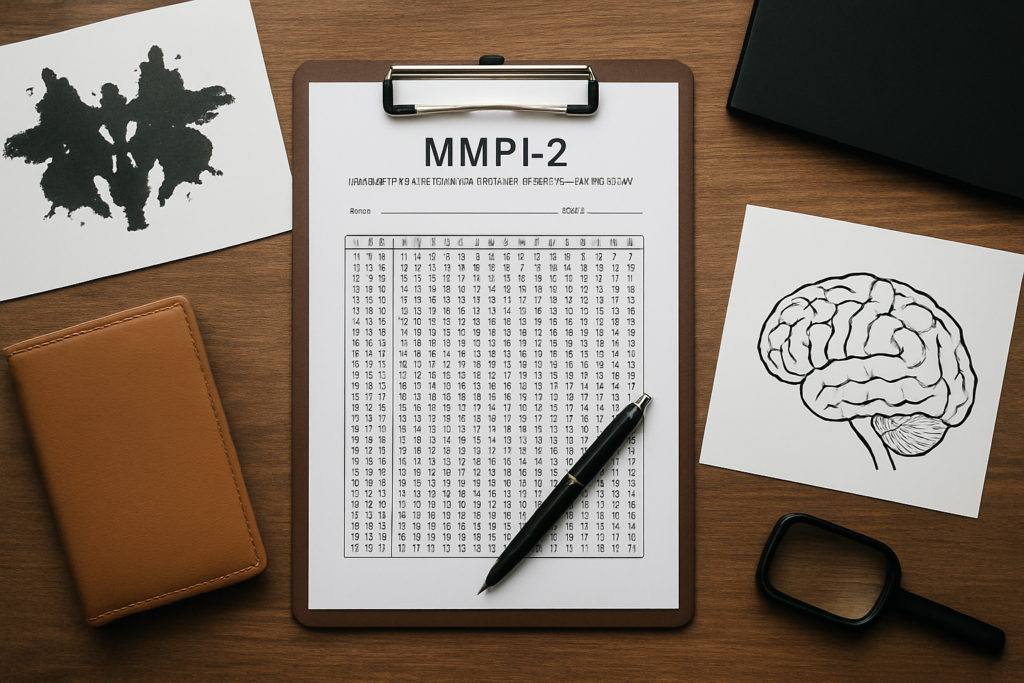The Role Of Forensic Psychology In Legal Cases
Forensic psychology is the specialized field that applies psychological expertise to legal proceedings, serving as a critical bridge between mental health science and the justice system. These professionals conduct mental health assessments, provide expert witness testimony, and help courts understand complex psychological factors in criminal, civil, and family law cases. At FC Psych Experts, we understand the vital importance of integrating psychological expertise into legal proceedings.
Key functions of forensic psychologists include:
- Evaluating defendant competency to stand trial
- Assessing psychological damages in personal injury cases
- Determining parental fitness in custody disputes
- Conducting risk assessments for public safety
- Providing expert testimony on mental health conditions
Forensic psychologists use scientifically validated methods including standardized psychological tests, structured clinical interviews, and behavioral observations to ensure their findings meet legal admissibility standards like Daubert and Frye. They work directly with attorneys, judges, and legal teams to translate complex psychological concepts into actionable legal insights, ultimately helping courts make informed decisions that balance justice with mental health considerations. The American Psychology-Law Society provides comprehensive resources on these professional standards.

Understanding Forensic Psychology
Forensic psychology means using psychological theories and techniques within legal settings. This field combines mental health expertise with courtroom requirements effectively. Forensic psychologists operate across multiple legal environments and case types regularly. They provide specialized knowledge in both criminal proceedings and civil litigation matters, often conducting specialized forensic evaluations that guide judicial decisions. Their professional assessments guide courts toward well-informed decisions about individual cases. These evaluations carefully consider each person’s mental health status and behavior patterns. Courts rely on this psychological expertise to understand complex human factors. This specialized knowledge helps ensure fair and appropriate legal outcomes.
Criminal cases often require forensic psychologists to evaluate defendant mental competency issues. They determine if someone understood their actions when committing alleged crimes. These professionals also assess whether defendants can participate meaningfully in trial proceedings. Civil cases involve evaluating psychological harm claims from various traumatic experiences, which may require comprehensive personal or emotional injury evaluations. Personal injury cases frequently require assessment of mental health impacts following accidents. Workplace harassment situations also need professional evaluation of psychological damages sustained. Family court cases require forensic psychologists to examine parental psychological functioning levels. These assessments help determine custody arrangements that protect children’s wellbeing effectively.
When Courts Request Forensic Psychology Services
Courts typically request forensic psychology services when mental health factors significantly impact legal decisions. These professional services become essential when psychological evidence can influence case outcomes. The legal system recognizes that mental health considerations often determine fair and appropriate rulings. According to the American Board of Forensic Psychology, these evaluations have become increasingly crucial in modern legal proceedings.
Common situations requiring forensic psychology services include:
- Competency hearings to determine if defendants can stand trial
- Criminal cases involving insanity pleas or diminished capacity defenses
- Custody disputes where parental fitness requires professional evaluation
- Civil cases with emotional damages claims needing validation
- Personal injury cases involving psychological trauma assessment
- Sentencing hearings where mental health impacts punishment decisions
- Workers compensation claims involving psychological injury evaluation
These requests ensure that psychological evidence receives proper consideration in legal proceedings effectively. Courts depend on professional evaluations to make informed decisions about complex cases involving mental health. Our neuropsychological evaluations often provide critical insights in cases involving brain injuries or cognitive impairments. Judges rely on forensic psychology expertise to understand how psychological factors affect legal outcomes. The integration of mental health knowledge helps create more just and appropriate legal decisions. Professional evaluations provide objective insights that guide courts toward fair resolutions for all parties.
The Scientific Methods Used in Forensic Psychology
Forensic psychologists employ rigorous scientific methods to ensure accurate and reliable assessment results consistently. Their methodology follows established protocols that meet both psychological and legal standards for evidence. Scientific rigor helps maintain credibility and objectivity throughout the evaluation process effectively. The American Academy of Forensic Psychology sets stringent guidelines for these methodological approaches.
Key scientific methods include:
- Standardized psychological tests with proven validity and reliability measures
- Structured clinical interviews following established protocols and guidelines
- Systematic behavioral observations in controlled and natural settings
- Comprehensive document reviews of medical records and legal materials
- Collateral interviews with family members and relevant witnesses
- Objective data analysis combining multiple reliable information sources
- Statistical interpretation of test results using established norms
These scientific approaches ensure that forensic psychology conclusions meet strict legal standards for courtroom evidence. Professional methodology protects against bias and maintains objectivity during complex psychological evaluations. Our team conducts thorough clinical psychological evaluations using these evidence-based methods. Data collection follows systematic procedures that can withstand legal scrutiny and cross-examination effectively. Multiple assessment methods provide comprehensive understanding of individual psychological functioning and mental health status. Scientific methodology ensures that psychological testimony provides reliable and valid information to legal decision-makers consistently.
Legal Standards That Guide Forensic Psychology Practice
Legal standards establish the framework within which forensic psychologists must operate professionally and ethically consistently. These standards ensure that psychological testimony meets courtroom requirements for admissible evidence. Professional practice guidelines protect both the integrity of psychological assessments and individual rights effectively. The American Board of Professional Psychology maintains certification standards that ensure professional competence.
Important legal standards include:
- Daubert standard requiring psychological testimony based on reliable scientific methods
- Frye standard demanding techniques be generally accepted within psychology community
- Professional competency requirements mandating specialized training in psychology and law
- Ethical guidelines requiring objectivity and impartiality during case evaluations
- Confidentiality rules that differ significantly from traditional therapy settings
- Evidence standards ensuring psychological conclusions meet legal admissibility requirements
- Professional licensing requirements specific to forensic psychology practice
These standards ensure that only credible psychological evidence reaches courtroom proceedings and influences legal decisions. Legal frameworks protect the rights of individuals while maintaining scientific integrity in psychological evaluations. The American Psychological Association provides comprehensive ethical guidelines that govern professional practice. Professional requirements guarantee that forensic psychologists possess necessary expertise for complex legal cases effectively. Ethical guidelines prevent conflicts of interest and ensure unbiased professional opinions throughout legal proceedings. Legal standards create accountability measures that support both justice system integrity and psychological practice quality consistently.

Main Functions of Forensic Psychologists in Court Cases
Forensic psychologists serve essential roles within the legal system through specialized professional services. These mental health experts bridge the gap between psychology and law effectively. They provide courts with crucial insights about human behavior and mental health conditions. Their expertise helps legal professionals understand complex psychological factors in various case types. Courts rely on their professional knowledge to make informed decisions about defendants and victims. This specialized field combines clinical psychology training with legal system understanding comprehensively. In family court matters, our attachment and bonding assessments provide crucial insights for custody determinations.
The primary responsibilities of forensic psychologists involve conducting thorough psychological evaluations and assessments. They also provide expert testimony to help courts understand mental health issues clearly. These professionals work across criminal, civil, and family court systems regularly and consistently. Their evaluations influence important legal decisions including custody arrangements and sentencing recommendations. The Florida Board of Psychology maintains strict standards for practitioners in these specialized roles. Forensic psychologists ensure that psychological factors receive appropriate consideration in legal proceedings. Their work promotes fair outcomes while protecting the mental health needs of everyone involved. Understanding these key functions helps explain how forensic psychology supports justice system operations.
Performing Mental Health Assessments
Mental health assessments form the core foundation of forensic psychology practice. These comprehensive evaluations typically include psychological testing and detailed clinical interviews. The process provides a thorough understanding of each individual’s current mental health condition. These assessments help legal professionals make informed decisions based on psychological evidence. Courts depend on these evaluations to understand complex mental health factors effectively. For educational cases, psychoeducational testing can identify learning disabilities that impact legal proceedings.
Typical Situations Requiring Mental Health Assessments:
- Providing custody recommendations for family court proceedings
- Establishing competency for trial participation
- Measuring psychological harm experienced by crime victims
- Analyzing mental health impacts in personal injury claims
These professional evaluations deliver unbiased insights about psychological elements affecting court cases. They help ensure that legal decisions account for everyone’s mental health needs. Courts can make fair and balanced rulings when psychological factors receive proper consideration. Evidence-based assessments enable forensic psychologists to support just legal outcomes consistently. Their work promotes both legal fairness and compassionate treatment of all parties. This approach ensures psychological wellbeing remains central to legal decision-making processes.
Delivering Expert Witness Testimony
Forensic psychologists frequently appear as expert witnesses to share their professional findings with courts. They present detailed opinions and research-based conclusions to court officials and juries effectively. This specialized testimony helps explain complicated psychological concepts in understandable terms for legal proceedings. Expert testimony makes mental health issues more accessible within courtroom settings for all participants. The National Alliance on Mental Illness recognizes the importance of professional mental health advocacy in legal settings.
Key aspects of expert witness testimony include:
- Explaining psychological test results and their implications for legal decisions
- Describing how mental health conditions affect behavior and decision-making abilities
- Providing professional opinions on competency and criminal responsibility issues
- Clarifying the relationship between psychological disorders and alleged criminal behavior
- Educating courts about relevant psychological research and scientific findings
- Answering questions during cross-examination while maintaining professional objectivity
- Translating complex psychological concepts into language that juries can understand
Courts benefit from professional explanations of psychological factors affecting specific cases and outcomes. Criminal cases often require forensic psychologists to explain defendant mental health conditions and their impacts. They describe how psychological disorders might have affected behavior during alleged offenses systematically. This expert perspective proves essential for understanding criminal motivations and assessing responsibility levels accurately. Family court cases require experts to explain how parental mental health affects childcare abilities. These explanations help judges make custody decisions that protect children’s best interests consistently. Learn more about us and our expertise in providing expert testimony.
Collaborating with Legal Teams and Attorneys
Forensic psychologists work closely with legal teams to provide psychological expertise throughout case development. This collaboration begins early in the legal process when attorneys need psychological insights. They help lawyers understand how mental health factors might influence their client’s situation. Legal teams rely on forensic psychology professionals to interpret complex psychological evidence accurately. These partnerships ensure that psychological considerations receive appropriate attention during case preparation effectively. The Department of Justice often relies on forensic psychology expertise in federal cases.
Key collaborative activities include:
- Consulting on case strategy and identifying relevant psychological factors
- Reviewing case materials to highlight mental health considerations
- Advising attorneys on psychological testing and evaluation procedures
- Interpreting psychological reports and assessment results for legal teams
- Preparing legal teams for cross-examination of opposing psychological experts
- Assisting with settlement negotiations involving psychological damages
- Providing ongoing consultation throughout lengthy legal proceedings
Effective collaboration requires clear communication between psychology and legal professionals consistently. Forensic psychologists must translate complex psychological concepts into practical legal applications. They help attorneys understand the strengths and limitations of psychological evidence in their cases. Our therapy services can support individuals throughout the legal process. Legal teams benefit from professional guidance on how psychological factors might influence case outcomes. This partnership approach ensures that psychological expertise enhances legal strategy development and case presentation effectively.
Conducting Risk Assessment and Safety Evaluations
Risk assessment represents a critical function of forensic psychologists in protecting public safety. These evaluations determine the likelihood of future dangerous or problematic behavior patterns. Courts depend on professional risk assessments to make informed decisions about bail, sentencing, and supervision. Risk evaluations help legal systems balance individual rights with community safety concerns effectively. Professional assessments provide objective data that guides important legal and safety decisions consistently. Mental Health America emphasizes the importance of comprehensive risk assessments in preventing future harm.
Common types of risk assessments include:
- Violence risk evaluations for criminal defendants and offenders
- Recidivism assessments predicting likelihood of repeat criminal behavior
- Suicide risk evaluations for individuals in custody or legal proceedings
- Child safety assessments in custody and abuse cases
- Domestic violence risk evaluations for protective order decisions
- Sexual offender risk assessments for sentencing and supervision planning
- Workplace violence assessments following threatening behavior incidents
These assessments use scientifically validated tools and methods to ensure accuracy and reliability. Risk evaluations consider multiple factors including mental health history, substance abuse, and social circumstances. In immigration proceedings, our immigration evaluations assess trauma and persecution risks. Professional assessments help courts make informed decisions about public safety and individual treatment needs. Risk assessment results influence parole decisions, treatment requirements, and supervision levels for offenders. Safety evaluations protect vulnerable populations while supporting appropriate legal interventions and community protection measures effectively.
Specialized Family Court Services
Family court proceedings often require specialized psychological services that address unique familial dynamics and child welfare concerns. Forensic psychologists provide essential evaluations that help courts navigate complex family relationships and determine arrangements that best serve children’s interests. Our family therapy services support families during challenging legal transitions.
When parents struggle with cooperation after separation, co-parenting counseling can facilitate healthier communication patterns that benefit children. In cases where parent-child relationships have been disrupted, reunification counseling provides structured therapeutic support to rebuild these crucial bonds safely. These specialized interventions often incorporate evidence-based approaches like cognitive behavioral therapy to address underlying psychological issues affecting family functioning.
Courts increasingly recognize that family dynamics require nuanced psychological understanding beyond standard evaluations. Professional guidelines from the APA Practice Organization emphasize the importance of specialized training for forensic psychologists working with families. These comprehensive services ensure that custody decisions, visitation arrangements, and therapeutic interventions align with both legal requirements and psychological best practices.
Conclusion
Forensic psychology plays an indispensable role in modern legal systems by bridging mental health expertise with courtroom requirements. These specialized professionals provide essential services that ensure psychological factors receive proper consideration in legal decisions. Their comprehensive evaluations, expert testimony, and collaborative efforts with legal teams create more informed and fair outcomes. The scientific methods and legal standards that guide their practice maintain credibility and objectivity throughout complex cases. Courts depend on forensic psychologists to translate complicated mental health concepts into understandable terms for judges and juries.
The integration of forensic psychology into legal proceedings represents a crucial advancement in justice system operations. From competency evaluations to risk assessments, these professionals protect both individual rights and public safety effectively. Their work ensures that mental health considerations influence custody decisions, sentencing recommendations, and treatment planning appropriately. As legal systems continue evolving, forensic psychology will remain essential for achieving balanced outcomes that prioritize both justice and compassion. Understanding these professional functions helps everyone appreciate how psychological expertise enhances legal decision-making processes. To learn more about our comprehensive forensic psychology services, please contact us today.
FAQs
What types of cases require forensic psychology services most often?
Criminal cases involving competency evaluations and insanity defenses commonly need forensic psychology input. Family court custody disputes and personal injury cases with psychological damages also frequently require these services.
How do forensic psychologists maintain objectivity when working with legal teams?
Professional ethical guidelines require forensic psychologists to remain impartial regardless of which side hired them. They focus on scientific evidence and clinical findings rather than advocating for specific legal outcomes.
Can forensic psychologists predict future criminal behavior with complete accuracy?
Risk assessments provide probability estimates based on scientific research but cannot guarantee future behavior predictions. These evaluations help courts make informed decisions while acknowledging inherent limitations in behavioral forecasting.
What happens if someone refuses to cooperate during a forensic psychological evaluation?
Courts can order individuals to participate in evaluations, but psychologists cannot force active cooperation. Limited cooperation affects evaluation quality and psychologists report these limitations to the court clearly.
How do forensic psychological reports differ from regular therapy documentation?
Forensic reports focus on legal questions and use objective testing methods for court purposes. They contain detailed analysis of specific legal issues rather than general therapeutic progress notes.



































